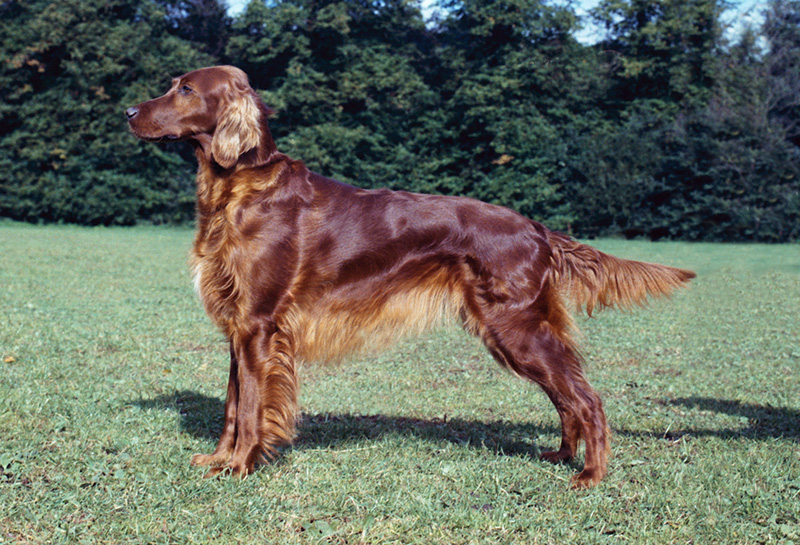Early neutering of bitches increases incontinence risk, study finds
The age at which female dogs (bitches) are neutered is associated with early-onset urinary incontinence, academics from the Royal Veterinary College (RVC) have revealed.
Urinary incontinence affects around three per cent of bitches in the UK. The condition can be distressing and costly for owners and also harm the welfare of affected dogs due to an increased risk of urinary infection and skin sores stemming from urine-soaked skin. The link between urinary incontinence and neutering in bitches has previously been suspected, but this new study now provides real evidence on the extent of this relationship.
The new research indicates that bitches of certain breeds including Irish setters, Dalmatians, Hungarian vizslas, Dobermans and Weimaraners are more prone to early-onset urinary incontinence than other breeds. This study therefore highlights that special care needs to be taken when deciding on whether to neuter these breeds.

The results identified an increased risk of 2.12 times of urinary incontinence in neutered bitches compared with entire bitches. Further to this, it identified an increased risk of 1.82 of urinary incontinence in bitches neutered before 6 months of age compared with those neutered from 6 to 12 months within the first two years following neuter.
Although there are many benefits to neutering bitches, these new results will help vets to make evidence-based recommendations on neutering and timing of neuter, whilst taking other neutering considerations into account.
Other key findings include:
- The average age at diagnosis of UI was 2.9 years.
- The average time from neuter to UI was 1.9 years.
- Bitches weighing over 30kg had 2.62 times the risk of UI compared with bitches weighing under 10 kg.
- Increasing body weight was also associated with an increased risk of early-onset urinary incontinence.
The research was carried out by the RVC’s VetCompass™ programme, and supported by BSAVA Petsavers, and is the largest cohort study on incontinence in bitches carried out worldwide to date. The study collected data from anonymised veterinary clinical records of 72,971 bitches within VetCompass™ born from January 1st 2010 to December 31st 2012 until 31st March 2018.
Camilla Pegram, VetCompass™ epidemiologist and lead researcher on the study, said: “Neutering is something that every owner will need to consider at some stage but there has been limited information on the risks of urinary incontinence following surgery up until now. The decision to neuter a bitch is complicated but the results of this study suggest that early-age neuter should be carefully considered, particularly in high-risk breeds and bitches with larger body-weights, unless there are major other reasons for performing it.”
The study, ‘Associations between neutering and early-onset urinary incontinence in UK bitches under primary veterinary care’, has been published by the Journal of Small Animal Practice - onlinelibrary.wiley.com/doi/10.1111/jsap.13072.
Notes to Editors
For more information please contact:
- Ploy Radford (ploy.radford@plmr.co.uk) or Jasmin De Vivo (Jasmin.DeVivo@mangomarketing.com)
- Press Line: 0800 368 9520
About the RVC
- The Royal Veterinary College (RVC) is the UK's largest and longest established independent veterinary school and is a constituent College of the University of London.
- The RVC is ranked as the world’s number one veterinary school in the QS World University Rankings 2019.
- The RVC offers undergraduate, postgraduate and CPD programmes in veterinary medicine, veterinary nursing and biological sciences.
- The RVC was the first veterinary school in the world to hold full accreditation from AVMA, EAEVE, RCVS and AVBC, and currently holds full accreditation from RCVS, AVBC and AVMA and conditional from EAEVE.
- In 2017, the RVC received a Gold award from the Teaching Excellence Framework (TEF) – the highest rating a university can receive.
- A research-led institution, the RVC maintained its position as the top veterinary institution in the Research Excellence Framework (2014), with 79% of its submission being rated as world-class or internationally excellent.
- The RVC also provides animal owners and the veterinary profession with access to expert veterinary care and advice through its teaching hospitals: the Beaumont Sainsbury Animal Hospital, in central London, and the Queen Mother Hospital for Animals (Europe's largest small animal referral centre) and Equine Referral Hospital, both located at the Hertfordshire campus.
You may also be interested in:
-
A painful tail: RVC research reveals which dogs have greatest risk of a tail injury
A new study from the Royal Veterinary College (RVC) has found that the Boxer, English Springer …


